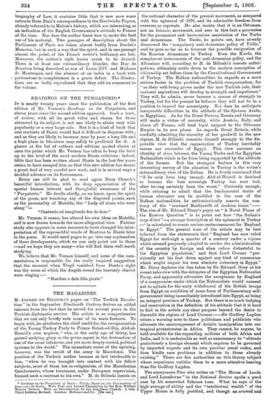READINGS ON THE PITRGATORIO.* IT is nearly twenty years since
the publication of the first edition of Mr. Vernon's Readings on the Purgatorio, and eleven years since the second edition appeared. Such a work, of course, with all its great value and charm for those attracted by its subject, is not one likely to attain very wide popularity or a very large sale. But it is a kind of book that real students of Dante would find it difficult to dispense with ; and as they are likely to increase year by year, a long life and a high place in literature may safely be predicted for it. A glance at the list of authors and editions quoted shows at once the pains which Mr. Vernon has taken to keep the book up to the level of the most modern Dante criticism : indeed, little that has been written about Dante in the last few years seems to have escaped him, so that this new edition has meant a great deal of very careful new work, and is in several ways a decided advance on its forerunners.
Every one will be glad to read again Dean Church's beautiful introduction, with its deep appreciation of the special human interest and thoughtful sweetness of the "Purgatorio." He dwells chiefly, as we know, upon the spirit of the poem, not touching any of the disputed points, such as the personality of Matelda, the "Lady all alone who went along "— "Cantando ed isoegliendo for da fore."
Mr. Vernon, it seems, has altered his own ideas on Matelda, and is now drawn towards the more allegorical view. Further study also appears in some measure to have changed his inter- pretation of the reproachful words of Beatrice to Dante later in the poem. It would need pages to go into any explanation of these developments, which we can only point out to those -and we hope they are many—who will find them well worth studying.
We 'believe that Mr. Vernon himself, and none of the com- mentators, is responsible for the really inspired suggestion that the moment when Virgil vanished from Dante's sight was the same at which the Angels round the heavenly chariot were singing :—
"Manibus o date ].ilia plenis."






































 Previous page
Previous page